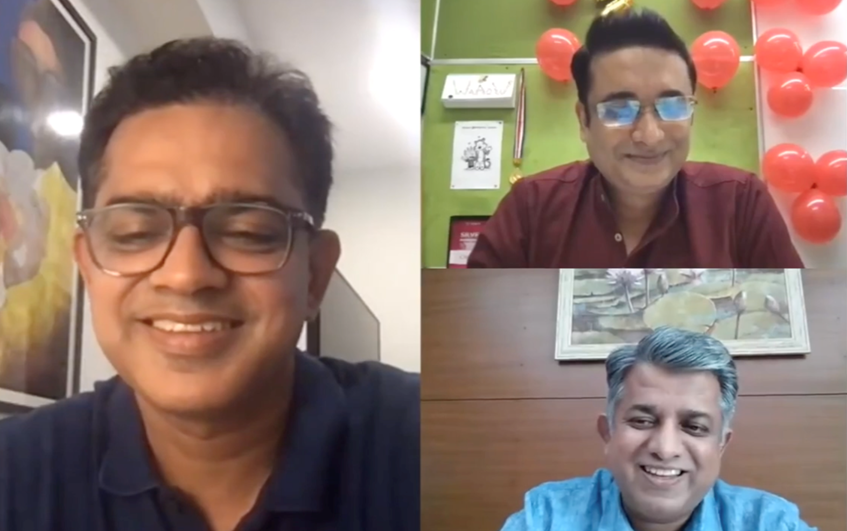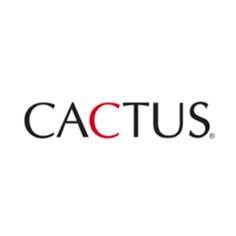CACTUS celebrated its 20th Foundation Day (May 25, 2022) with an online gathering of Cactizens from around the word. A highlight of the event was a tête-à-tête between the event’s host, COO and Head, Editage, Vikas Narang, and CACTUS co-founders Abhishek and Anurag Goel.
This is an edited transcript of the chat.

Vikas: CACTUS is 20 today, Abhishek, Anurag. How does it feel?
Abhishek: It feels great. If we were in the office, I would have shared with passion how it feels. But yeah it feels good.
Anurag: It feels lots of things. It feels great. It feels like a long time. It also feels like a short time. More than anything it feels that if you stick around long enough and you persevere, you’ll get somewhere.
Vikas: Back when you started CACTUS, did you actually think that we would be celebrating 20 years?
Anurag: I think we knew that we wanted to build a company that lasts. We set out to build a large enterprise and for the first few years the question always was that we are addressing such a niche, can we become large? Is this opportunity large enough? Not many people know this, but we were one of the first e-learning providers with a platform where you have the instructor and the student online. This was in 2002 or 2003. We diversified into a lot of things early on.
I think we diversified too early. We made a lot of mistakes early on. But later, with focus, we were successful in one vertical and then we expanded into other verticals.
To answer your question, yes, we always wanted to build a company that kept going. A lot of the philosophy that went into building the company – there were these books called Build to Last and Good to Great by Jim Collins – a lot of those philosophies we imbibed and we tried to implement. We always thought of this as a company that would outlive all of us.
Abhishek: I think there was a dichotomy we lived with. There was this side that was worried if the market was large enough and if we could do it. But on the other side we were actually building the company like it would last forever. In 2003, we had a wall in one of the rooms in our house that was covered with flipcharts, and we answered 20 questions from a book on visioning. There were many questions that required a very hard think about the future. I remember one of the questions was “what are the potential risks to the business?” At that point we were working only in Japan and we put down “what if Japan has a major earthquake?” It seemed far-fetched. We wrote about foreign exchange currency risks because we’d be operating across the globe. There were many of those elements. We were building for the extreme long term, say 100 years or more, but we were worried if we’d survive the next few years.
I’ve always thought that we would get there; we’d solve our problems. In fact the early conversations I would have would be around working with the prime minister’s office in Japan and the government of Japan and having a confidential, secure editing department within the government that will help them communicate better internationally. But these are all ideas. Many of the ideas materialized, many didn’t get anywhere.
Vikas: Do you remember some of the turning points that brought us to where we are today?
Abhishek: At some point, we started feeling that we will be able to scale from the demand side but it seemed impossible to scale from the supply side. It was impossible to find folks who were interested in editing as a career, motivate them, and get them excited about this as an opportunity. So when we adopted the freelance model, I think that was one critical turning point. If we’d not done it at the time, I don’t think we would have made it this far. It served us well.
Another critical juncture was when we brought tech in-house. Earlier, tech was completely outsourced. We were working with an IT service provider and projects were constantly delayed by a year at the very least. Moving tech in-house set the foundation for where we are today and where we are likely to go in the future.
I should also mention China. For a good five years, we would fail every time we tried to make inroads in China. Then Shriram Poonja [Chief Growth Officer] agreed to move to China. I think that was a turning point in our understanding of how different China is as a market.
Anurag: Maybe I can spin it in a different way. There were many strategic deaths we faced and we came out of it every time. The first question we asked ourselves was: are we large enough? And so we expanded internationally even when we were small. Immediately after Japan, we went to South Korea, then China. Many people don’t know that we made our first entry into China as early as 2005 or 2006 and there was not much success. That was in a way a strategic death. If we had not expanded geographically fast enough, we wouldn’t have been where we are today.
I remember when we moved to the freelancing model, at one point, the editorial work was shared by the in-house team and freelancers because we didn’t know how well freelancing would work out for us. And we started asking ourselves, if it is possible to outsource to freelancers, what is the need for us to do this in-house? The freelancer was doing the bulk of the work, so there was a lot of fear around the survival of the core in-house team.
Further down, when publishers started offering the same services to authors, we thought the authors would naturally prefer the publishers because they that’s where the home for the manuscript is. We wondered if we’d survive this. But we did survive it.
It’s not as if we know now what we’re going be five years from now. But how you deal with the challenges, opportunities, and competition and come out victorious every time, I think we’ve been able to do that very well and hopefully we’ll continue to do that very well moving ahead.
Abhishek: I’ll just close out with one comment. I’m most excited about our purpose, which is just two years old. Prior to that we had articulated our purpose differently and the new purpose statement that we have – To Enable People to Reach Their Highest Potential – I believe that is what will take us to 100 years and beyond.
We’re #JustGettingStarted: https://cactusglobal.com/anniversary/

